Three sets of numbers that I owe a lot of thanks to readers of my blog.
1.1.14 - 9.30.14 = 19,247 page views, YTD Totals
9.1.14 - 9.30.14 = 3,921 page views, Highest monthly total
9-18.14 = 203 page views, Highest daily total
Viewed in 112 Countries
Thanks everybody ! ! !
Bob Yeager
Tuesday, September 30, 2014
James Glickenhaus Buys Ferrari Modulo Concept
YAHOO AUTOS
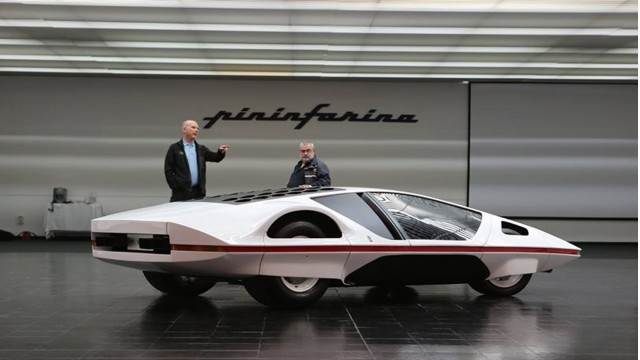
The awesome car collection of James Glickenhaus has just been graced by the addition of one of the rarest and most legendary automobiles in existence, the Ferrari Modulo concept. The concept was penned by Pininfarina designer Paolo Martin using the chassis of a donor Ferrari 512 S race car, and it was first shown to the public at the 1970 Geneva Motor Show.
Since then it’s been kept and maintained—yes, it’s a functioning car—by Pininfarina, but now the Italian design house has sold it to Glickenhaus. It’s not clear how much he paid for the car but we do know he plans to make it road legal, just like he did with another concept bought from Pininfarina, the Ferrari Dino Competizione of 1967.
"Against long odds I've gotten Pininfarina to sell me Modulo, which we will awaken and make roadworthy as we did with Dino Competizione," Glickenhaus told Road & Track.
Making the Modulo road legal won’t be easy but Glickenhaus is in no rush. Most of the conversion work will take place in Europe and the car isn’t due to join the rest of the Glickenhaus collection in New York until sometime next year. He plans to show it at Italy’s Concorso d'Eleganza Villa d'Este before it’s shipped over.
Glickenhaus has very close ties with Pininfarina, which was responsible for his stunning Ferrari P4/5 by Pininfarina coachbuilt supercar that was based on the Ferrari Enzo. Now, Glickenhaus has his formed his own car company, Scuderia Cameron Glickenhaus (SCG), and is working on a car dubbed the 003 which he not only plans to sell but also race.
Interestingly, the Ferrari Modulo concept has previously been tied with SCG’s 003. The forward-sliding roof design—the Modulo doesn’t have conventional doors—was previously reported to have inspired part of the design of the 003. We'll know for sure once the 003 makes its debut at the 2015 Geneva Motor Show next March.
Since then it’s been kept and maintained—yes, it’s a functioning car—by Pininfarina, but now the Italian design house has sold it to Glickenhaus. It’s not clear how much he paid for the car but we do know he plans to make it road legal, just like he did with another concept bought from Pininfarina, the Ferrari Dino Competizione of 1967.
"Against long odds I've gotten Pininfarina to sell me Modulo, which we will awaken and make roadworthy as we did with Dino Competizione," Glickenhaus told Road & Track.
Making the Modulo road legal won’t be easy but Glickenhaus is in no rush. Most of the conversion work will take place in Europe and the car isn’t due to join the rest of the Glickenhaus collection in New York until sometime next year. He plans to show it at Italy’s Concorso d'Eleganza Villa d'Este before it’s shipped over.
Glickenhaus has very close ties with Pininfarina, which was responsible for his stunning Ferrari P4/5 by Pininfarina coachbuilt supercar that was based on the Ferrari Enzo. Now, Glickenhaus has his formed his own car company, Scuderia Cameron Glickenhaus (SCG), and is working on a car dubbed the 003 which he not only plans to sell but also race.
Interestingly, the Ferrari Modulo concept has previously been tied with SCG’s 003. The forward-sliding roof design—the Modulo doesn’t have conventional doors—was previously reported to have inspired part of the design of the 003. We'll know for sure once the 003 makes its debut at the 2015 Geneva Motor Show next March.
Porsche 918 Hypercar Goes up in Flames: Video
YAHOO AUTOS
Say it ain’t so momma, say it ain’t so! This is the first reported fire of Porsche’s new 918 hypercar. And it is quite tragic, but, not completely unexpected. It’s almost like a rite of passage for supercars to go up in flames these days.
This one happened in Toronto, and was scooped by the guys at Jalopnik courtesy of a few friendly tipsters. It happened at an area gas station, which, thankfully enough, didn’t explode in the aftermath of the fire.
No word on exactly how this whole fire started, but by the looks of it, it doesn’t seem like this million dollar exotic will be able to be saved. For shame.
September 26: “Knight Rider” brings KITT to life on this date in 1982
YAHOO AUTOS
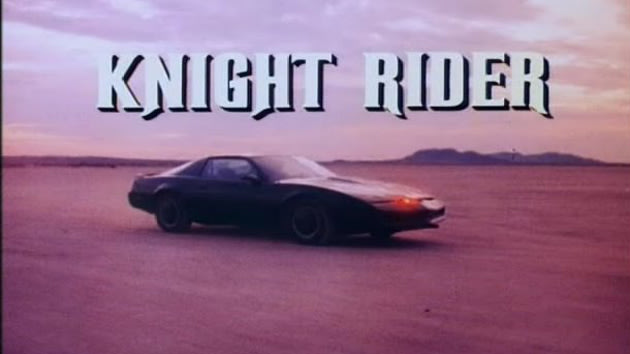
How is it that a guy fighting crime with a talking Pontiac Trans Am became one of the favorite TV shows of a generation? I was watching "Knight Rider" when it debuted on this date in 1982, and as a kid I remember caring little about whatever David Hasselhoff was up to in between appearances by the Knight Industries Two Thousand.
Creator Glen Larson said he wanted to do a sci-fi version of "The Lone Ranger" with Tonto as a talking car, but the masterstroke was having William Daniels as the voice; as NBC would prove with its ill-fated relaunch, the concept goofs itself to oblivion without Daniels' intelligent overtones coming through the grille. Now if they'd only make self-driving cars more like KITT.
September 29: The Chevy Camaro first hit the streets on this date in 1966
YAHOO AUTOS

1967 Chevy Camaro
Even before Ford launched the Mustang in 1964, executives at General Motors knew they'd need a stouter two-door sports car than the Corvair. The idea percolated inside the company under the code name XP-836; it was often known as the Panther, and at least one mockup carried the name Chaparral, borrowed from Chevy's successful Trans-Am racers.
The name had been revealed in June of 1966, and with a slow rollout to build anticipation, Chevy put the Camaro — a name derived from an obscure French-English dictionary that supposedly meant "friend" — on sale on this date in 1966.
That first generation offered a choice of eight engine setups, including the stonking 427 V-8, and three trim levels, with the Z/28 edition coming a year later. It's one of the most classically perfect designs GM has ever produced, and has lost none of its power in the nearly five decades since its launch. Here's the first ad for the Camaro, something that hasn't worn as well:
Photo: Douglas Pittman via Motoramic group on Flickr
Monday, September 29, 2014
September 25: Henry Ford makes the five-day work week standard on this date in 1926
Y
Posted By Justin Hyde @Motoramic
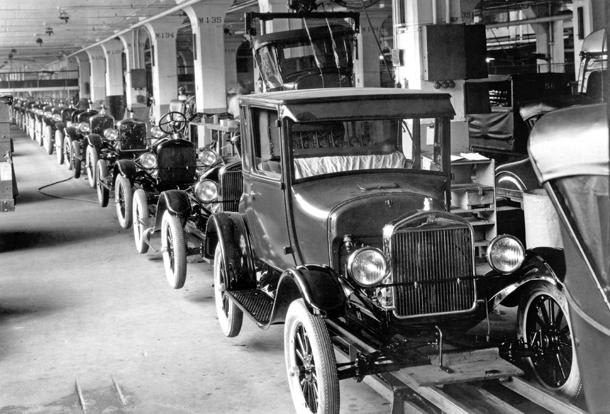
By the time Henry Ford announced on this date in 1926 that he would make his plants and offices work on a standard five days a week rather than six, he had already drawn the ire of other industrialists for doubling his workers' pay to $5 for an eight-hour day.
The moves weren't altruistic; Ford expected the same level of production from his workers in less time, and believed if he paid them well, he'd create a bigger market for his cars. But his attitudes were generous compared to the view of many Gilded Age bosses who believed most workers would use any off hours to get drunk.
Any concern Ford had about that was eased by Prohibition, and because Ford was one of the world's largest manufacturers, most of its suppliers immediately followed suit — making the five-day week a standard for the country.
Ford would explain a month later a lesson some executives struggle with today: "The harder we crowd business for time, the more efficient it becomes. The more well-paid leisure workmen get, the greater become their wants. These wants soon become needs.
Well-managed business pays high wages and sells at low prices. Its workmen have the leisure to enjoy life and the wherewithal with which to finance that enjoyment."
Ferrari reveals a topless 458 Speciale for 499 shrewd investors
YAHOO AUTOS

It has been said that driving doesn't get any better than when behind the wheel of the $298,000, 596-hp Ferrari 458 Speciale. Only now it does, as a topless version has surfaced promising to make that driving experience even more evocative still.
The Ferrari 458 Speciale A ("A" standing for "Aperta" which in turns stands for "open" in Italian) remains mechanically identical to the hardtop Speciale, and is set to be revealed in person at the Paris auto show. The 4.5-liter V-8, revving to 9,000 rpm, still lurks behind the driver, and the same reworked 7-speed dual-clutch transmission routes that power to the rear wheels.
What has changed is the folding roof -- which it does in just 14 seconds. Naturally such a feature adds weight, and along with the various strengthening devices needed to keep the Speciale A rigid under cornering load, it tips the scales around 110 lbs. heavier than the hardtop. That said, it remains almost 200 lbs. lighter than the regular 458 Spider, which it beats handily in a drag race to 62 mph, completing the run 0.4 seconds faster in 3.0 seconds.
Only 499 Speciale As will be produced, making it as rare as it is beautiful. Part of its beauty derives from a racing-inspired paintwork with blue-tinted carbon fiber winglets, as well as blue-tinted Alcantara seats. These options are specific to what may be the final 458 of its kind.
What has changed is the folding roof -- which it does in just 14 seconds. Naturally such a feature adds weight, and along with the various strengthening devices needed to keep the Speciale A rigid under cornering load, it tips the scales around 110 lbs. heavier than the hardtop. That said, it remains almost 200 lbs. lighter than the regular 458 Spider, which it beats handily in a drag race to 62 mph, completing the run 0.4 seconds faster in 3.0 seconds.
Only 499 Speciale As will be produced, making it as rare as it is beautiful. Part of its beauty derives from a racing-inspired paintwork with blue-tinted carbon fiber winglets, as well as blue-tinted Alcantara seats. These options are specific to what may be the final 458 of its kind.
We're expecting the super car's successor to feature a 3.8-liter twin-turbo V-8, like in the new California T. And while that engine does a wonderful job of masking its lower revs and turbo lag, there's no denying that you miss those final moments where the engine screams to its 9,000 rpm red line. The Speciale A might be the last we see of this glorious engine, which should make 499 buyers mighty pleased with their investment.
Cadillac will name new flagship CT6, give other models new names as well
YAHOO AUTOS
Posted By Abigail Bassett @ Motoramic

Photo illustration by Yahoo Autos
Like BMW and Infiniti before it, Cadillac is playing the re-naming game — starting with that new upcoming large luxury sedan which it will call the CT6. This is not the Eldorado you were hoping for.
On the heels of GM’s announcement this week that Cadillac would open a new headquarters in New York City’s Tony Soho neighborhood with 50 employees, the company announced Tuesday that new CT6 would kick off a complete renaming of its car line; the abbreviation “CT” would be used for car models and the number indicates the size and position of the car within Cadillac’s brand structure.
"As we expand the portfolio, we can assist consumers in placing the cars within a structure, as they compare cars both within our showroom and across the market generally,” saidUwe Ellinghaus, Cadillac chief marketing officer. “However, this will be an evolutionary process – we will only change a product’s name when the product itself is redesigned or an all-new model is created, as in this instance.”
The shuffle may cause some confusion for customers. For a few years, Cadillac showrooms will carry a mix of models named like the current ATS, CTS and XTS and newer CT-types. There hasn’t been any word as to whether there will be a new naming convention for the Escalade and SRX SUVS.
It’s not that surprising that Cadillac has jumped on the digits and letters bandwagon (or is it BNDWGN?) Infiniti, much to the chagrin of many, made a similar move when it renamed its cars by the Q and QX in late 2012. That change was shepherded by former Audi and Infiniti executive Johan de Nysschen — the new head of Cadillac.
The new CT6 is slated to make its debut at the 2015 New York Auto Show in April next year and will be available in late 2015 — if you can remember what it's called.
2015 Roush Mustang Looks So Much More Aggressive
YAHOO AUTOS
The 2015 Ford Mustang has been pretty universally praised for its good looks. But Roush has taken it to the next level and made the iconic pony car sexy in a sort of aggressive way.
As pictures from a photo shoot at Automobile demonstrate, this is the best body kit yet produced by Roush. It begs the question: why doesn’t Roush just design Mustangs to begin with?

OK, so maybe Roush can’t design an entire car. I have to give the Ford engineers some credit. The Roush team, though, has created a gorgeous front fascia and grille that extend the front end and sharpen the soft curves of the stock model. Roush has also added new hood vents and an optional hood scoop.
Automobile reports there are also new hood vents and an optional hood scoop, in addition to rear fender vents and a redesigned rear fascia and rear spoiler that make for a significantly cleaner appearance out back.
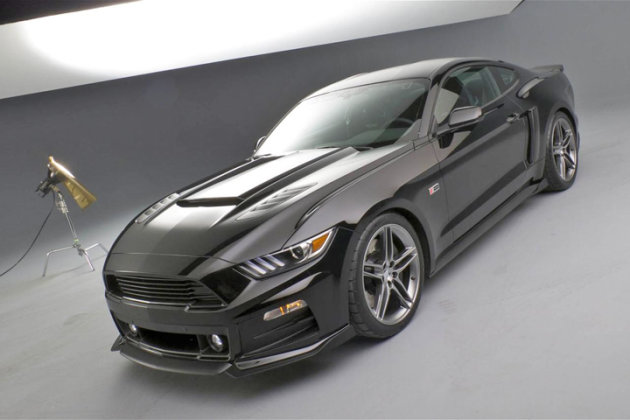
The report also says Roush will offer various levels of tuning kits, including RS, RS1, and RS2 for the new car. But given the 2015 Ford Mustang’s expanded engine lineup, the structure is a bit different.
RS kits are for Mustang V-6 models; RS1 kits focus on the turbocharged Mustang EcoBoost; RS2 uses the naturally aspirated 5.0-liter V-8; and we can assume that, like with previous Roush Mustangs, RS3 adds a supercharger to the V-8 with various stages of power available.
Sunday, September 28, 2014
Will Ultracapacitors Save Start-Stop Systems From Consumer Wrath?
YAHOO AUTOS
Start-stop systems, which switch off a car's engine while it's stopped to boost fuel efficiency, are now entering the U.S. market in serious numbers.
Many European makers, including BMW, Mercedes-Benz, and MINI, are fitting them as standard on 2015 models, and there are more to come: By 2022, some forecasts expect start-stop to be included on more than half of U.S. vehicles.
But car buyers often dislike the feature, which is not only unfamiliar but can also send vibrations through the car when the engine restarts.
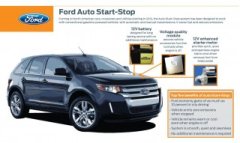
Ford Auto Start-Stop fact sheet
Worse, some early data appears to show that the beefier lead-acid starter batteries that enable the system to restart the engine dozens of times a day may need to be replaced more frequently.
That has led some analysts and electronics companies to suggest that start-stop systems will soon include not only the advanced-glass mat (AGM) batteries but also a small ultracapacitor to ease the power draw on those batteries.
In heavy traffic or frequent use, such systems may be required to restart the engine several dozen times a day--increasing the battery's duty cycle substantially.
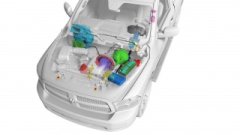
2013 Ram 1500 - engine start-stop system
A recent article in trade journal Ward's Auto looks at the potential for ultracapacitor use in future. It notes that the electronic devices are still expensive, but that costs are coming down.
At the moment, only a few vehicles include ultracapacitors--a dozen or so models sold in Europe by PSA Peugeot Citroen, with sales now totaling more than 1 million units.
In the U.S., ultracapacitors are used on the Lamborghini Aventador, not a car most U.S. drivers will ever have a chance to drive, and two Mazda models.
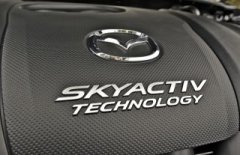
2014 Mazda 6 Sport
A slightly different approach is used for Mazda's start-stop system, known as i-ELOOP. It stops the engine at the precise point in its rotation that it can be restarted simply by firing the correct spark plug.
In that case, the ultracapacitor is used to store energy that runs the accessories--climate control, lights, audio, and other systems--while the engine is off.
Mazda says it expects about 10 percent of its buyers to specify the system, which is optional, on its 2015 Mazda 6 mid-size sedan and Mazda 3 compact models.
Ferrari 458 Gets a Recall Because of Its Trunk
YAHOO AUTOS
The Ferrari 458 has an issue with the junk in its trunk. More accurately, it’s an issue with getting junk, or people out of the trunk, and it’s cause enough for the NHTSA to issue a recall for the car.
According to the NHTSA, “The secondary latch for the front trunk storage compartment may not release when the vehicle is stationary. As such, these vehicles fail to comply with the requirements of Federal Motor Vehicle Safety Standard No. 401, ‘Interior Trunk Release’.”
Given that the space is just 8.12 cubic feet, it’s not likely a heck of a lot is going to fit in there, but it’s a safety concern just the same, especially for wayward kids.

The recall affects 2010-2014 F458 Italia and F458 Spider vehicles manufactured between March 5, 2010 and May 20, 2013 which will be repaired by Ferrari. All owners are expected to be contacted about the recall by then end of September and instructed to bring their cars into dealers to have the problem fixed.
Dealers will be making modifications to the existing latch system so that it will always properly disengage so no one can get trapped. In the meantime, don’t let your kids and really small friends play with the trunk of your 458.
2015 Audi S3 Adds Power, But Loses Personality: First Drive
YAHOO AUTOS
Small cars are getting bigger. Big cars are getting smaller. Mercedes and Audi both sell cars that start close to $30K, yet are still considered “luxury.” The world has gone insane.
But what do I know? The Audi A3 is proving to be one of the brand’s best selling cars in recent history. Actually, last month was the automaker’s most successful sales month ever. You can partially thank the A3 for that massive increase.
So with the A3 solidifying Audi’s role in the small sedan market, the next logical step would be to heat up the relatively tame sedan with some go fast parts a la Audi’s “S” line. And that they did.

Inside, you’re getting a fully loaded interior with an infotainment screen that pops right out of the dash, navigation, a backup camera, and a big, clunky steering wheel that reminds you you’re driving something expensive. But it’s not just all show and no go.
The new 2.0-liter TFSI turbo pumps out 292 horsepower, up from the A3′s 220 horsepower. It manages to get to sixty in just 4.7 seconds. And did I mention it only comes in automatic? Because it only comes in automatic.

That being said — is it safe to say that this sporty Audi drives like a sporty Audi? Surprise, surprise, it does. You get pretty responsive power, you get really crisp steering, and even when you’re not in “Dynamic” driving mode, it doesn’t sacrifice sporty cues in the name of mpg. We even got a chance to drive it around Circuit of the Americas in Austin, which was only slightly terrifying.

The A3 and S3 sit on Volkswagen’s new MQB platform, which underpins the new Golf, GTI, Golf R and a few others. Like the new Golf and GTI (which I’ve already driven), the S3 feels too safe, too ordinary. There’s nothing about it that really reaches out and grabs you.
It looks better than the A3, sure, and it drives better too, but you’re not getting near the same amount of personality behind the wheel that you might find in, say, a CLA45 or BMW 235i. It’s just not there.

But for me, I can’t get behind a car that just feels like another high-powered cog in Volkswagen Group’s well-oiled machine. I just can’t.
Let’s all just cross our fingers and hope Audi will be adding an R to the beginning of that nameplate, or at least a manual gearbox. Then they might get my attention.
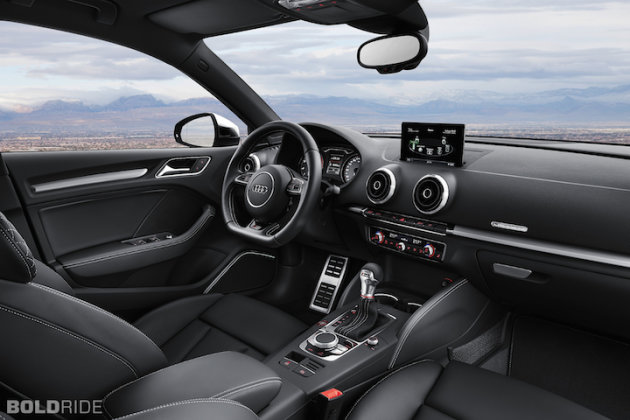
Specs:
Engine: 2.0-liter TFSI
Horsepower: 292
0-60: 4.7 seconds
Price: $41,995
Positives:
Very precise
Quality interior
Refined gearbox
Comfortable ride
Very precise
Quality interior
Refined gearbox
Comfortable ride
Negatives:
Lacking personality
Lacking personality
DeepFlight Dragon: A $1.5 Million Underwater Explorer
YAHOO AUTOS
Hopping on a plane and surveying the wild blue yonder isn’t exactly an impossible feat anymore. So why should exploring the ocean’s depths be any less accessible? That’s the attitude of DeepFlight, a submarine company bent on bringing high-performance and the feeling of flight to the submersible world.
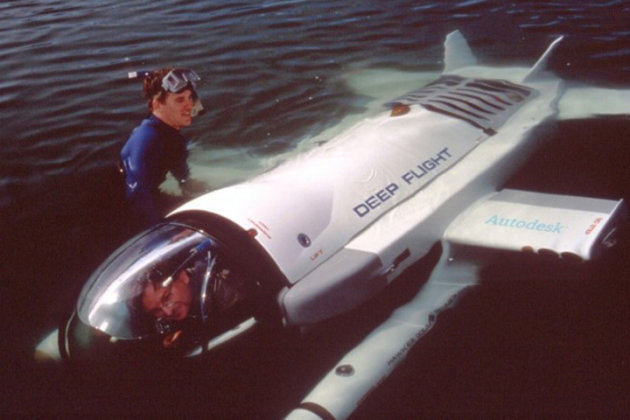
But now there’s a new one – and it’s called the Dragon.
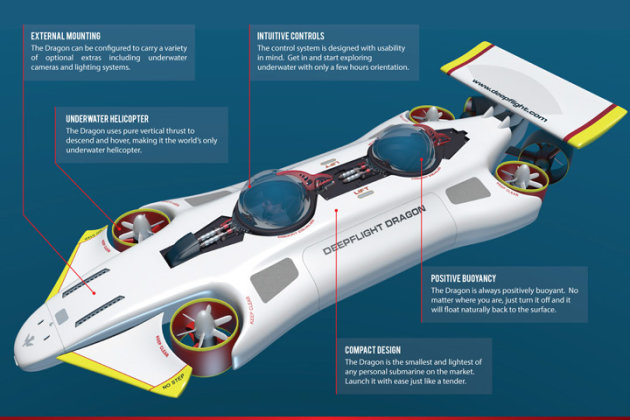
It can dive up to around 400 feet deep and cruise at speeds of 4 knots with two crew members in tow. As with Super Falcon, the craft relies on aerodynamic principles such as lift and drag rather than buoyancy or displacement to take to the deep.

Winglets provide negative lift, which in turn pulls the positively buoyant sub down. Since the sub naturally stays buoyant (no ballast used), it will always float to the surface if something does malfunction.
The Dragon marks the first of DeepFlight’s five submersible generations to adopt hover capabilities. The sub packs on four brushless DC thrusters in addition to its main electric drive motor and underwater lithium battery to enable the craft to hover silently and negotiate complex underwater obstacles. It’s efficient too. DeepFlight estimates run-times of around six hours between charges.

So if you like the sound of unhindered underwater flight, it’s time to pull out your wallet. According to Gizmag, DeepFlight is currently taking orders on the upcoming Dragon at $1.2 million a pop (later to be $1.5 million), which we’ll admit is quite a chunk of change. But it is still a heck of a lot cheaper than the Mark II.
Saturday, September 27, 2014
Toyota's C-HR concept tries to carve style into crossovers
YAHOO AUTO

Toyota C-HR Concept
The global boom for crossover SUVs has left car designers scrambling. Traditional ideas of beauty in vehicles call for long, low, sculpted forms — not chassis designed to ride high and hold enough cargo to double as a dorm room.
It's to be expected when automakers try a radical take or two, even as, with the Toyota C-HR Concept revealed today, the results seemed jumbled. Make enough folds and something might work, right?
Looking quite like a Local Motors Rally Fighter under the spell of a Scooby Doo villain hypnotist, Toyota says the C-HR "introduces an expressive new, diamond architecture styling theme," with "lower bodywork (that) has been sculpted to represent the facetted surfaces of a highly-durable, precision-cut gemstone."
Power comes from a unspecified hybrid engine or the captured wingbeats of butterflies — it's a concept car, so whatever's under the hood is there purely for show. (Looking at the hood in these pictures, I'm not even sure how it would open.)

Toyota C-HR Concept
Like the wildest creations of any Paris fashion show, the C-HR's style sacrifices nothing to practical concerns, like rearview mirrors or rear sightlines or a roofline that would be capable of seating humans.
But the future of a car like this isn't in its whole but its parts: maybe there's a way to adapt that glass-to-glass channel across the C-pillar and the persistence-of-vision lighting to a production car. If we're all going to want plus-size cars, our sense of style will have to catch up.
This Is What The 2015 Ford Mustang Might Have Looked Like
YAHOO AUTOS
By now you’ve probably read our first drive report on the 2015 Ford Mustang and come up with your own impressions of the car. But would your impressions be any different had the new Mustang turned out like the one pictured here?
It’s just one of the hundreds of design proposals for the sixth-generation Mustang that Ford Motor Company [NYSE:F] executives sifted through before settling on a final design.
Once a design was selected, exterior and interior stylists worked to perfect the lines throughout the car, resulting in the look we first saw last December.
The design work started in mid-2009, when the updated fifth-gen car was in production. The goal was a design that was contemporary, but unmistakably Mustang.
The design also had to ensure that the new Mustang maintained the combination of style, performance and everyday usability that the nameplate has come to signify over the past 50 years.
Throughout 2011, hundreds of initial sketches were narrowed down to a handful of proposals that would be transformed into a batch of clay models for evaluation in three dimensions. After further development, three themes went into the final selection phase in early 2012.
By the summer of that year, a winning design was picked and work started on transforming it into a real car.
Designers, clay sculptors and digital modelers spent countless hours refining the lines and surfaces that create the three dimensional body side and the powerful hunches as well as the long-sculpted hood with a forward leaning nose that give the new Mustang its unique look and personality.
A similar story can be told for the interior. Here, the team paid close attention to the relationships of the various elements, and designed them in a way to achieve optimum fit and finish. The final theme was inspired by the wing of an airplane.
“To the people inside Ford, Mustang is considered the heart and soul of the company,” Ford design chief Moray Callum says of the 2015 Mustang’s design process.
“We spent a lot of time amongst the team and with customers discussing the history of Mustang and what it meant to people and concluded that we needed to move forward with a modern design that retained the essence of the brand.”
It’s just one of the hundreds of design proposals for the sixth-generation Mustang that Ford Motor Company [NYSE:F] executives sifted through before settling on a final design.
Once a design was selected, exterior and interior stylists worked to perfect the lines throughout the car, resulting in the look we first saw last December.
The design work started in mid-2009, when the updated fifth-gen car was in production. The goal was a design that was contemporary, but unmistakably Mustang.
The design also had to ensure that the new Mustang maintained the combination of style, performance and everyday usability that the nameplate has come to signify over the past 50 years.
Throughout 2011, hundreds of initial sketches were narrowed down to a handful of proposals that would be transformed into a batch of clay models for evaluation in three dimensions. After further development, three themes went into the final selection phase in early 2012.
By the summer of that year, a winning design was picked and work started on transforming it into a real car.
Designers, clay sculptors and digital modelers spent countless hours refining the lines and surfaces that create the three dimensional body side and the powerful hunches as well as the long-sculpted hood with a forward leaning nose that give the new Mustang its unique look and personality.
A similar story can be told for the interior. Here, the team paid close attention to the relationships of the various elements, and designed them in a way to achieve optimum fit and finish. The final theme was inspired by the wing of an airplane.
“To the people inside Ford, Mustang is considered the heart and soul of the company,” Ford design chief Moray Callum says of the 2015 Mustang’s design process.
“We spent a lot of time amongst the team and with customers discussing the history of Mustang and what it meant to people and concluded that we needed to move forward with a modern design that retained the essence of the brand.”
_______________________________________
Russian socialite coats her Mercedes in 1 million Swarovski crystals
YAHOO AUTOS

Remember when young women used to Bedazzle their cell phones? That craze seems to have now passed, but on the streets of London a 21-year-old Russian socialite has found a new way to express her inner Paris — by bedazzling her Mercedes-Benz with 1 million Swarovski crystals.
Daria Radionova, a Russian business student, told the Daily Mail that the people who covered every part of her 2011 Mercedes CLS 350 in crystals, from the door handles to the Mercedes badges, came over from Russia and worked "12 hours a day for two months." She parked the car outside of the Levin Hotel in Knightsbridge on Monday and caused quite the stir.
The diesel CLS, with its license plate reading "BAII BYY," truly came alive when day turned into night, and London's lights glistened off the fancy Merc's body.
There is no word regarding how much Radionova spent on the transformation (she reportedly used $33,000 worth of faux diamonds), but the Russian-born student did take offense to the Mail saying she paid "just" £25,000 (about $41,000) for the vehicle, stating on her Facebook page that "the car is worth more than 25k."
With the crystal-encrusted Mercedes' newfound fame, it's sure to be worth more than that now, and if Radionova ever decides to sell the car, she claims all proceeds will go to charity. But for now it appears she will just enjoy her creation, saying that, "If you have the cash, why not do it?"
And unlike a bedazzled iPhone, a glass-covered Mercedes makes a far bigger statement – and a larger cut out of one's wallet.
- Swarovski crystals
Private license-plate scanners invade our privacy — but recovered my car
YAHOO AUTOS

Cameras on the road
Imagine a world where your daily travels can be bought and sold to anyone who is interested in tracking you.
Sound far-fetched? It's not when it comes to your daily driver.
There are now nearly a billion stored, digitized images of license plates throughout the United States.
This, along with the temporary storage of hundreds of millions of other plates, represents a new market of public information that can be accessed by nearly anyone who has an interest in your whereabouts.
The bank that finances your car. Your employer. An attorney seeking damages. Or even a private investigator seeking a skeleton or two in your closet. They all can find out where you have been, and even where you are likely to go in the near future.
The opportunity to capitalize on this public information is also far quicker than you would imagine.
I know it can work this quickly for one reason: I have personally used this tech to reclaim my own property.
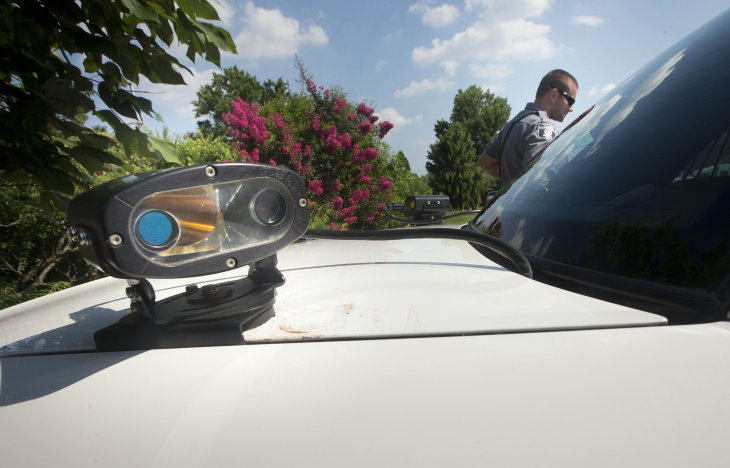
Digital Recognition Network, an information provider to banks and auto finance companies, tells its clients who are seeking to find their vehicles: "Your authorized agents receive real-time alerts when in the vicinity of your asset. Within minutes the vehicle identity is validated, an assignment order transmitted and the asset secured."
As a car dealer in rural Georgia, I recently had to recover one of my own vehicles, a Honda Civic, from the most difficult type of person to repossess a car from — a repo man.
In my particular case, this meant that I would have to send a 10-day demand letter asking to have my asset returned, then file a warrant application, then wait for two months, meet with a judge, and hopefully convince him or her that the thief never had any intention to pay me.
Finally, after three months of paperwork and waiting, I would hope that my car was still located at the same property listed on the bill of sale. If the offending party had moved, or was just hiding my vehicle elsewhere, I would have to head right back to square one and start the entire process over again.
Thanks to the license plate readers and the storing of the Civic's whereabouts, I was able to get back my property, which had turned out to be driven by the thief's brother. What had been three months of legal work and aimless searching turned into a quick and painless process.
Predatory practices, whether it is an individual, a business, or a public agency, is one of many concerns that makes the recording of digitized license plates a double-edged sword.
In Montgomery County, Md., one police officer was able to scan nearly 50,000 license plates over a four-day period. On the good side, four stolen vehicles were recovered and 26 drivers with suspended driver’s licenses (and others with no insurance coverage) were identified and cited.
For those who have lost their vehicles to uninsured motorists and criminals, license plate readers can, in many scenarios, be a definite savior.
However, this type of technology can easily turn into a lucrative boon which turns law-abiding citizens into unwitting targets. In the example above, there were also 255 traffic citations issued.
More than a few of those were related to emissions-equipment violators who, to be frank, are often driving an older vehicle just to get by.
License plate readers are not cheap, costing up to $100,000 each. This represents a considerable investment that often requires a high level of traffic enforcement revenue or data sales in order to offset the expense. But strained public safety budgets don’t represent the sole market for this technology – businesses are also starting to invest in it.
The question is whether public surveillance will be used within reason, or whether this represents one more giant step towards the permanent undoing of what Supreme Court Judge Louis Brandeis termed, “the right to be left alone...the right most valued by civilized men."
Sound far-fetched? It's not when it comes to your daily driver.
There are now nearly a billion stored, digitized images of license plates throughout the United States.
This, along with the temporary storage of hundreds of millions of other plates, represents a new market of public information that can be accessed by nearly anyone who has an interest in your whereabouts.
The bank that finances your car. Your employer. An attorney seeking damages. Or even a private investigator seeking a skeleton or two in your closet. They all can find out where you have been, and even where you are likely to go in the near future.
The opportunity to capitalize on this public information is also far quicker than you would imagine.
I know it can work this quickly for one reason: I have personally used this tech to reclaim my own property.

License-plate scanner on a police car. Photo: AP
Digital Recognition Network, an information provider to banks and auto finance companies, tells its clients who are seeking to find their vehicles: "Your authorized agents receive real-time alerts when in the vicinity of your asset. Within minutes the vehicle identity is validated, an assignment order transmitted and the asset secured."
As a car dealer in rural Georgia, I recently had to recover one of my own vehicles, a Honda Civic, from the most difficult type of person to repossess a car from — a repo man.
Unfortunately, we coexist in society alongside folks who regularly steal, hide, and lie their way through life because they know our legal system will protect them.
In my particular case, this meant that I would have to send a 10-day demand letter asking to have my asset returned, then file a warrant application, then wait for two months, meet with a judge, and hopefully convince him or her that the thief never had any intention to pay me.
Finally, after three months of paperwork and waiting, I would hope that my car was still located at the same property listed on the bill of sale. If the offending party had moved, or was just hiding my vehicle elsewhere, I would have to head right back to square one and start the entire process over again.
Thanks to the license plate readers and the storing of the Civic's whereabouts, I was able to get back my property, which had turned out to be driven by the thief's brother. What had been three months of legal work and aimless searching turned into a quick and painless process.
Predatory practices, whether it is an individual, a business, or a public agency, is one of many concerns that makes the recording of digitized license plates a double-edged sword.
In Montgomery County, Md., one police officer was able to scan nearly 50,000 license plates over a four-day period. On the good side, four stolen vehicles were recovered and 26 drivers with suspended driver’s licenses (and others with no insurance coverage) were identified and cited.
For those who have lost their vehicles to uninsured motorists and criminals, license plate readers can, in many scenarios, be a definite savior.
However, this type of technology can easily turn into a lucrative boon which turns law-abiding citizens into unwitting targets. In the example above, there were also 255 traffic citations issued.
More than a few of those were related to emissions-equipment violators who, to be frank, are often driving an older vehicle just to get by.
License plate readers are not cheap, costing up to $100,000 each. This represents a considerable investment that often requires a high level of traffic enforcement revenue or data sales in order to offset the expense. But strained public safety budgets don’t represent the sole market for this technology – businesses are also starting to invest in it.
The unfortunate truth is that there is no privacy for a license plate on a public road. License plate readers and the digitized storage of these records can certainly lower crime and the cost of doing business; if I have to use it again to recover stolen property, I will do so without pause.
The question is whether public surveillance will be used within reason, or whether this represents one more giant step towards the permanent undoing of what Supreme Court Judge Louis Brandeis termed, “the right to be left alone...the right most valued by civilized men."
Subscribe to:
Comments (Atom)




